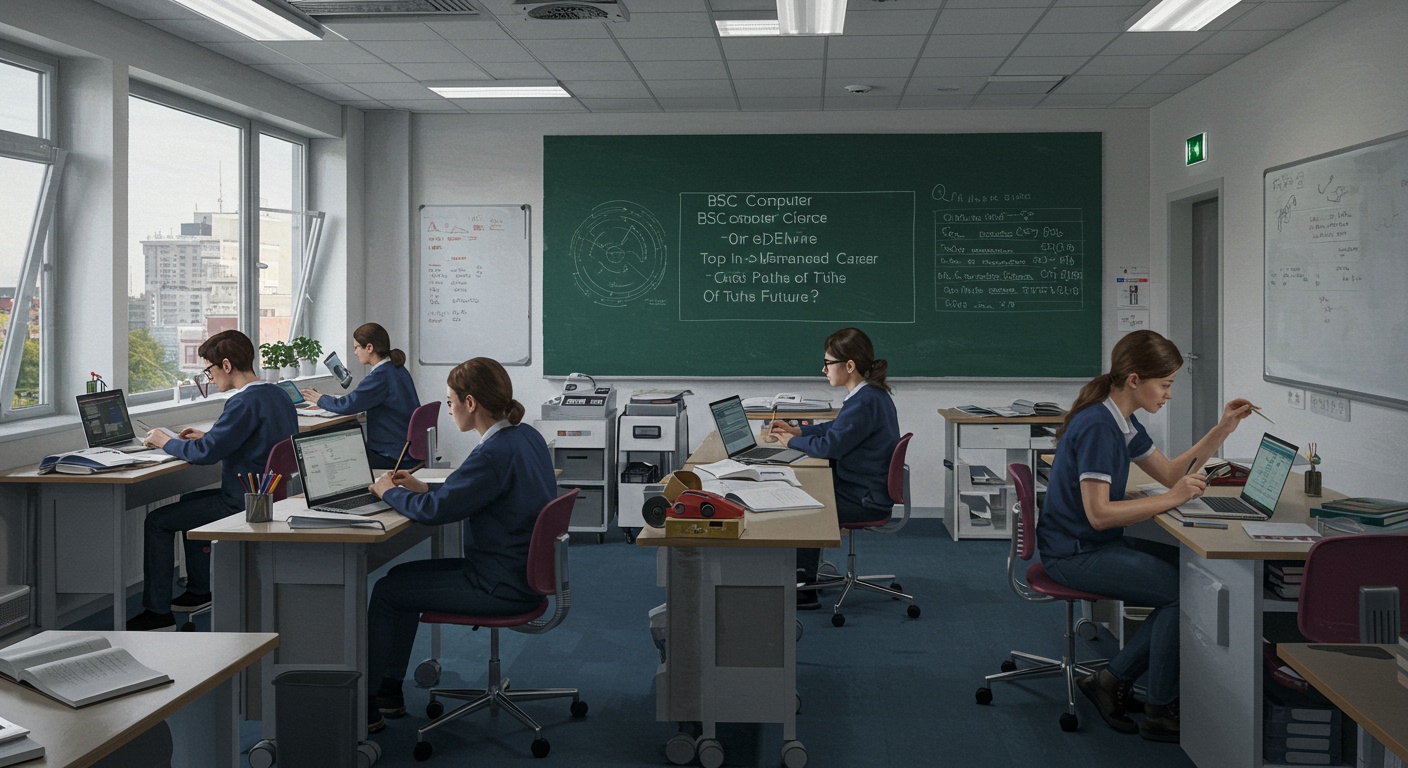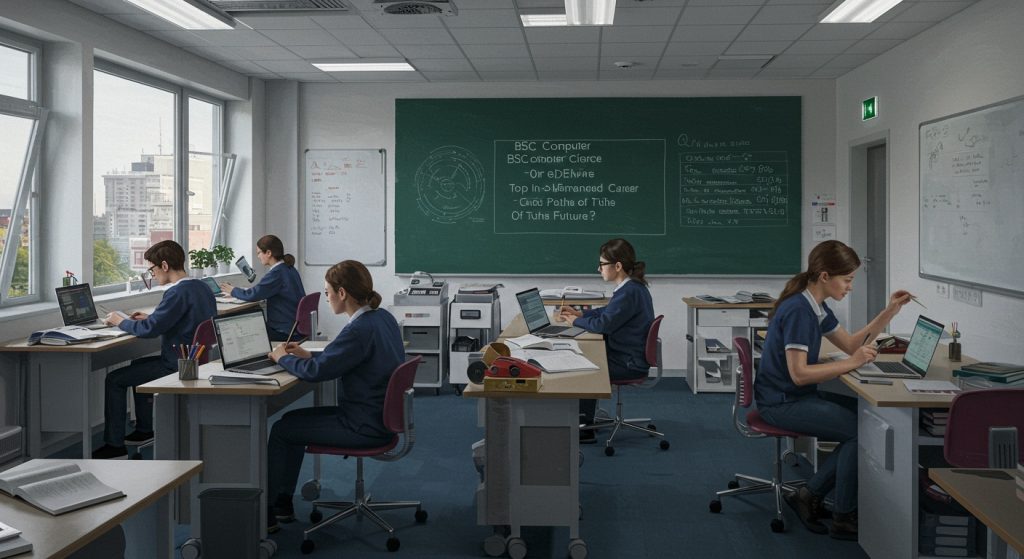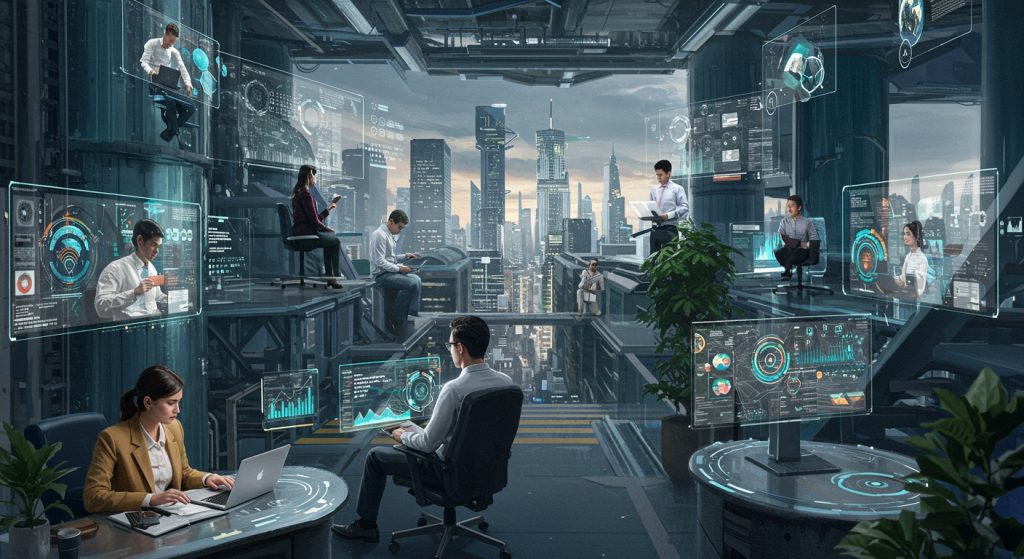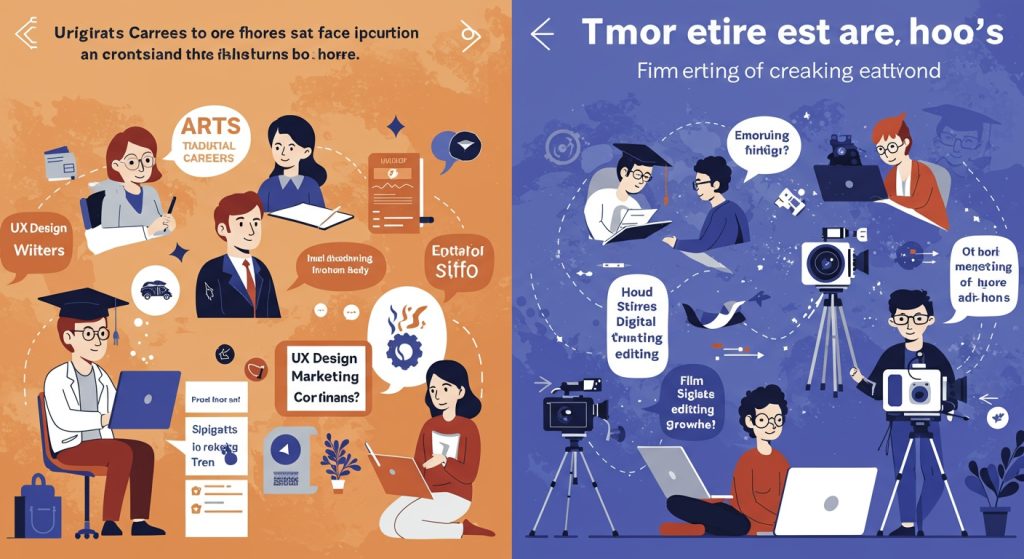Earning a BSc in Computer Science opens doors to a rapidly evolving landscape. Which paths offer the most promising futures? We’ll explore the most in-demand career options, focusing on areas experiencing explosive growth. Consider the increasing demand for AI specialists, fueled by advancements in deep learning and neural networks, or the booming cybersecurity sector driven by escalating data breaches and sophisticated attacks. We’ll also examine opportunities in cloud computing, where expertise in platforms like AWS and Azure is highly sought after. Finally, we’ll assess the impact of blockchain technology and the growing need for skilled developers in decentralized systems, offering a glimpse into tomorrow’s career horizons.

Decoding the BSc Computer Science Degree: A Launchpad to Tomorrow’s Careers
A BSc in Computer Science is more than just a degree; it’s a gateway to a vast and rapidly evolving landscape of technological innovation. It provides a strong foundation in computational theory, algorithm design, data structures. Software engineering principles. This foundation equips graduates with the analytical and problem-solving skills necessary to thrive in a diverse range of careers. Understanding what this degree truly entails is the first step towards navigating the exciting career options it unlocks.
Artificial Intelligence and Machine Learning Specialist
The rise of AI and Machine Learning (ML) has created a massive demand for specialists in these fields. AI involves creating intelligent agents that can reason, learn. Act autonomously. ML, a subset of AI, focuses on developing algorithms that allow computers to learn from data without explicit programming.
- Definition: AI is the broader concept of machines mimicking human intelligence. ML is a specific approach to achieving AI through algorithms that learn from data.
- Key Technologies: Python, TensorFlow, PyTorch, Natural Language Processing (NLP), Computer Vision.
- Real-world Applications: Self-driving cars, fraud detection, medical diagnosis, personalized recommendations (e. G. , Netflix, Amazon).
As an AI/ML specialist, you might be involved in:
- Developing new AI models for image recognition or natural language understanding.
- Building machine learning pipelines for data analysis and prediction.
- Implementing AI solutions in various industries, from healthcare to finance.
The demand for these skills is soaring. A BSc in Computer Science provides a strong starting point for pursuing a career in this cutting-edge field. Many universities offer specialized AI/ML courses as part of, or after, the BSc. Consider focusing your elective courses and final year project on AI/ML topics to enhance your expertise.
Data Scientist: Unveiling Insights from Data
Data science is the art and science of extracting knowledge and insights from data. Data scientists use statistical methods, machine learning algorithms. Data visualization techniques to assess large datasets and identify trends, patterns. Anomalies.
- Definition: Data science combines computer science, statistics. Domain expertise to extract actionable insights from data.
- Key Technologies: Python, R, SQL, Hadoop, Spark, Tableau, Power BI.
- Real-world Applications: Market research, customer behavior analysis, risk management, fraud prevention, personalized marketing.
A Data Scientist’s responsibilities can include:
- Collecting and cleaning data from various sources.
- Developing and implementing machine learning models.
- Creating data visualizations and dashboards to communicate insights.
- Presenting findings to stakeholders and making data-driven recommendations.
A BSc in Computer Science equips you with the programming and algorithmic skills necessary for data science. Supplementing your degree with courses in statistics and data analysis will further enhance your prospects.
Cybersecurity Analyst: Protecting Digital Assets
In an increasingly interconnected world, cybersecurity is paramount. Cybersecurity analysts are responsible for protecting computer systems, networks. Data from cyber threats. They identify vulnerabilities, implement security measures. Respond to security incidents.
- Definition: Cybersecurity is the practice of protecting computer systems and networks from unauthorized access, use, disclosure, disruption, modification, or destruction.
- Key Technologies: Firewalls, intrusion detection systems, security data and event management (SIEM) systems, penetration testing tools.
- Real-world Applications: Protecting financial institutions, government agencies, critical infrastructure. Personal data.
A Cybersecurity Analyst’s daily tasks may involve:
- Monitoring networks for suspicious activity.
- Conducting vulnerability assessments and penetration testing.
- Developing and implementing security policies and procedures.
- Responding to security incidents and breaches.
A BSc in Computer Science provides a solid foundation in computer architecture, networking. Operating systems, all of which are crucial for cybersecurity. Specializing in cybersecurity through certifications like Certified Ethical Hacker (CEH) or CompTIA Security+ can further enhance your career prospects.
Software Developer: Building the Digital World
Software developers are the architects of the digital world. They design, develop, test. Deploy software applications for various platforms, including web, mobile. Desktop.
- Definition: Software development is the process of creating computer programs.
- Key Technologies: Programming languages (Java, Python, C++, JavaScript), software development frameworks (React, Angular, Spring), databases (SQL, NoSQL).
- Real-world Applications: Developing web applications, mobile apps, enterprise software. Video games.
Different types of software developers include:
- Front-End Developers: Focus on the user interface and user experience of web applications.
- Back-End Developers: Focus on the server-side logic and database management.
- Full-Stack Developers: Work on both the front-end and back-end of web applications.
- Mobile App Developers: Develop applications for mobile devices (iOS and Android).
A BSc in Computer Science provides a strong foundation in programming principles and software engineering methodologies. Gaining experience through internships and personal projects is essential for becoming a successful software developer. Open-source contributions are also highly valued by employers.
Cloud Computing Architect: Designing and Managing Cloud Infrastructure
Cloud computing has revolutionized the way businesses operate. Cloud architects are in high demand. They are responsible for designing, building. Managing cloud infrastructure and services.
- Definition: Cloud computing is the delivery of computing services—including servers, storage, databases, networking, software, analytics. Intelligence—over the Internet (“the cloud”) to offer faster innovation, flexible resources. Economies of scale.
- Key Technologies: Amazon Web Services (AWS), Microsoft Azure, Google Cloud Platform (GCP), virtualization technologies (VMware, Hyper-V), containerization (Docker, Kubernetes).
- Real-world Applications: Hosting websites and applications, storing data, running analytics. Providing software as a service (SaaS).
Cloud architects need to be proficient in:
- Designing cloud infrastructure that meets business requirements.
- Selecting appropriate cloud services and technologies.
- Managing cloud resources and ensuring security.
- Optimizing cloud costs and performance.
A BSc in Computer Science provides a solid foundation in networking, operating systems. Distributed systems, all of which are essential for cloud computing. Cloud certifications, such as AWS Certified Solutions Architect or Microsoft Certified Azure Solutions Architect, are highly valued in this field.
Internet of Things (IoT) Engineer: Connecting the Physical World
The Internet of Things (IoT) refers to the network of physical devices, vehicles, home appliances. Other items embedded with electronics, software, sensors. Network connectivity, which enables these objects to collect and exchange data. IoT engineers design, develop. Maintain these connected systems.
- Definition: IoT is the network of physical objects (“things”) embedded with sensors, software. Other technologies for the purpose of connecting and exchanging data with other devices and systems over the Internet.
- Key Technologies: Embedded systems, sensors, wireless communication protocols (Bluetooth, Wi-Fi, Zigbee), cloud platforms (AWS IoT, Azure IoT Hub), data analytics.
- Real-world Applications: Smart homes, smart cities, industrial automation, healthcare monitoring, connected vehicles.
An IoT Engineer might work on:
- Designing and developing embedded software for IoT devices.
- Integrating sensors and actuators into IoT systems.
- Developing cloud-based platforms for data collection and analysis.
- Ensuring the security and reliability of IoT networks.
A BSc in Computer Science combined with knowledge of electronics and embedded systems is ideal for a career in IoT. Specializing in areas such as sensor technology, wireless communication, or cloud computing can further enhance your expertise.
Blockchain Developer: Building Decentralized Applications
Blockchain technology is revolutionizing various industries, from finance to supply chain management. Blockchain developers are responsible for designing, developing. Implementing blockchain-based applications.
- Definition: Blockchain is a distributed, immutable ledger that records transactions in a secure and transparent manner.
- Key Technologies: Blockchain platforms (Ethereum, Hyperledger Fabric), smart contracts, cryptography, distributed consensus algorithms.
- Real-world Applications: Cryptocurrencies, supply chain tracking, digital identity management, voting systems.
A Blockchain Developer’s responsibilities may include:
- Developing smart contracts for automating agreements.
- Building decentralized applications (dApps) on blockchain platforms.
- Integrating blockchain technology into existing systems.
- Ensuring the security and scalability of blockchain solutions.
A BSc in Computer Science provides a strong foundation in cryptography, data structures. Distributed systems, all of which are crucial for blockchain development. Learning smart contract programming languages like Solidity and gaining experience with blockchain platforms like Ethereum are essential for pursuing a career in this field.
Career Guidance: Charting Your Path with a BSc in Computer Science
The career paths outlined above are just a few examples of the many opportunities available to BSc Computer Science graduates. Your specific career path will depend on your interests, skills. Experience. It is vital to actively seek career guidance and explore different options through internships, personal projects. Networking. Consider attending industry events, joining online communities. Seeking mentorship from experienced professionals. Tailoring your education and experiences to a specific career path will significantly increase your chances of success in the rapidly evolving field of computer science. Remember to constantly update your skills and knowledge to stay ahead of the curve and remain competitive in the job market.
Conclusion
The journey through the in-demand career paths for BSc Computer Science graduates reveals a landscape brimming with opportunity. We’ve seen how fields like AI, cybersecurity. Data science are not just buzzwords. Real avenues for impactful and lucrative careers. The key takeaway here isn’t just knowing these paths exist. Understanding that continuous learning and adaptation are your most valuable assets. Consider this your implementation guide. Start small: pick one area that genuinely excites you and delve deeper. Don’t just passively read articles; build a project, contribute to open source, or take an online course. Practical application trumps theoretical knowledge every time. To measure your success, track your skill development and portfolio growth. Are you consistently learning new technologies? Are you able to showcase your abilities through demonstrable projects? If so, you’re on the right track. Remember, the future of computer science is being written now. With the right preparation, you can be one of its authors.
More Articles
IIT Bombay: How AI Is Shaping The Future Of Engineering Degrees
Future-Proof Your Career: Options After BSc in Computer Science
BSc Maths Graduates: Discovering The Best Job Opportunities For You
Top Career Paths: What Can You Do With a BSc in Statistics?
FAQs
So, I’m thinking about a Computer Science degree… What kind of super cool jobs can I actually get in the future that are really in demand?
Great question! With a BSc in Computer Science, you’re setting yourself up for some seriously hot careers. Think Artificial Intelligence and Machine Learning Engineer (everyone wants AI!) , Cybersecurity Analyst (keeping everything safe online is crucial), Data Scientist (making sense of all that data!). Software Developer (still the backbone of the tech world, always innovating).
AI Engineer sounds fancy. What does an AI Engineer actually do?
Fancy indeed! , they design, build. Test AI models. They might work on anything from self-driving cars to virtual assistants. It’s all about creating systems that can learn and adapt, making human lives easier (or more interesting!) .
Data Scientist… I hear that thrown around a lot. Is it just crunching numbers all day?
It’s more than just crunching numbers, although there’s definitely some number-crunching involved! Data Scientists review large datasets to find patterns and insights that businesses can use to make better decisions. They’re like detectives for data, uncovering hidden stories. Think helping companies interpret customer behavior or predicting market trends.
Okay, cybersecurity sounds crucial. Is that just about hacking?
Not at all! It’s actually the opposite of hacking. Cybersecurity Analysts are the digital guardians. They protect computer systems and networks from cyber threats like hackers and malware. They identify vulnerabilities, implement security measures. Respond to security breaches. So, they’re the good guys (or gals) preventing the bad guys from getting in.
What skills, besides coding, will really make me stand out in these fields?
Coding is essential, of course! But strong problem-solving skills are huge, along with critical thinking, communication (you need to explain complex things simply!). A willingness to learn continuously. Tech changes fast, so staying up-to-date is key.
Is it worth specializing during my BSc, or should I keep things broad?
That depends on your personality! Specializing can give you a head start in a specific field (like AI or cybersecurity). Keeping things broad gives you more flexibility. A good approach is to take introductory courses in different areas and then focus on what you enjoy most. You can always specialize further with postgraduate studies or certifications later on.
Will these jobs still be around in, say, 10 years? Tech changes so fast!
That’s the million-dollar question! While the specific technologies might evolve, the underlying principles and skills will remain valuable. The need for AI, cybersecurity, data analysis. Software development isn’t going away anytime soon. Focus on building a strong foundation and being adaptable. You’ll be well-equipped for whatever the future throws your way.



